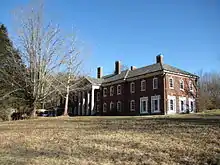Massachusetts Audubon Society
The Massachusetts Audubon Society (Mass Audubon), founded in 1896 by Harriet Hemenway and Minna B. Hall, headquartered in Lincoln, Massachusetts, is a nonprofit organization dedicated to "protecting the nature of Massachusetts". Mass Audubon is independent of the National Audubon Society (NAS), just as in the neighboring state of Connecticut, where Connecticut Audubon Society is independent of the NAS. Both Mass Audubon and Connecticut Audubon Society were founded earlier than the NAS. Mass Audubon protects 36,500 acres of land throughout Massachusetts, saving birds and other wildlife, and making nature accessible to all with its wildlife sanctuaries and 20 nature centers.
 | |
 Oak Knoll visitor center in Attleboro, Massachusetts | |
| Formation | 1896 |
|---|---|
| Type | Non-profit organization |
| Purpose | Protecting the nature of Massachusetts |
| Headquarters | Lincoln, Massachusetts |
| Coordinates | 42.409866°N 71.331850°W |
Region served | Massachusetts |
President | David O'Neill |
Main organ | Board of Directors |
| Website | www.massaudubon.org |
History
The Massachusetts Audubon Society (or Mass Audubon) was born out of Harriet Hemenway's desire to stop the commercial slaughter of birds for women's ornamental hats. Hemenway and her cousin, Minna Hall, soon enlisted 900 women and formed a partnership with many from Boston's scientific community to form their organization. They named the organization the Massachusetts Audubon Society in honor of the bird painter John James Audubon. In 1905, a national committee of Audubon societies was developed. This committee was vital in passing the Migratory Bird Conservation Act in 1913 and the Migratory Bird Treaty Act of 1918 with Great Britain. The passage of these measures effectively eliminated the commercial plume trade.[1]
Mass Audubon's first wildlife sanctuary, Moose Hill Wildlife Sanctuary in Sharon, Massachusetts, dates back to 1916 when the board accepts an offer of Sharon resident George Field to use his property as a bird sanctuary. Mass Audubon purchased the parcel in 1922.[1]
Wildlife sanctuaries

Mass Audubon's statewide network of wildlife sanctuaries welcomes visitors of all ages and is a home for more than 150 endangered and threatened native species.
- Allens Pond Wildlife Sanctuary, Westport
- Arcadia Wildlife Sanctuary, Easthampton
- Blue Hills Trailside Museum, Milton
- Boston Nature Center, Mattapan
- Broad Meadow Brook Conservation Center and Wildlife Sanctuary, Worcester
- Broadmoor Wildlife Sanctuary, Natick
- Daniel Webster Wildlife Sanctuary, Marshfield
- Drumlin Farm Wildlife Sanctuary, Lincoln
- Felix Neck Wildlife Sanctuary, Edgartown
- Education Center and Wildlife Sanctuary, Belmont
- High Ledges Wildlife Sanctuary, Shelburne
- Ipswich River Wildlife Sanctuary, Topsfield
- Joppa Flats Education Center
- Long Pasture Wildlife Sanctuary, Barnstable
- Moose Hill Wildlife Sanctuary, Sharon
- North River Wildlife Sanctuary, Marshfield
- Oak Knoll Wildlife Sanctuary, Attleboro
- Pleasant Valley Wildlife Sanctuary, Lenox
- Richardson Brook Wildlife Sanctuary, Tolland
- Stony Brook Wildlife Sanctuary, Norfolk
- Tidmarsh Wildlife Sanctuary, Plymouth
- Wachusett Meadow Wildlife Sanctuary, Princeton
- Wellfleet Bay Wildlife Sanctuary, South Wellfleet
- Mass Audubon Museum of American Bird Art, Canton
Camp Wildwood
Camp Wildwood, established in 1950, is the Society's only overnight summer camp, and it is accredited by the American Camp Association.[2] The 159 acre camp is currently located in Rindge, New Hampshire, on Hubbard Pond, bordering 1,494-acre Annett State Forest.[2] This is the camp's third location, which it moved to in 2003 after previously being a boy scout camp called Camp Quinapoxet.[3][4][5][6] The property includes a central shower house, arts and crafts center, 135-seat dining hall, health center, office, camp store, seven cabin sites, an archery range, high and low ropes challenge course, playing field, and several trails and areas of forest and wetland for exploration.[6]
During the summers, Camp Wildwood hosts campers ranging from ages 7 to 17. The programs at the camp include a day camp, a three-day session for campers 7 to 8 years old, one- and two-week sessions for campers ages 9 to 16, one- and two-week off-site Treks for campers ages 14–17, and a several-week long Leadership program (called LIT/LIA, meaning Leaders in Training and Leaders in Action) for campers ages 16 and 17. The camp also hosts several three-day long "Family Camp" sessions throughout the summer for all ages.[7]
Camp Wildwood was originally located at Greenfield State Park in Massachusetts until 2003, when it moved to its current location.[6]
References
- "Massachusetts Audubon Society Makes First Land Purchase". massmoments.org. Retrieved April 17, 2018.
- "About Wildwood". Mass Audubon. Retrieved August 16, 2019.
- "Troop 54 - Scout Camps Closed". troop54.froimson.net. Retrieved August 26, 2019.
- "Camp Quinapoxet". kahagon131.tripod.com. Retrieved August 26, 2019.
- "Camp Wildwood (was Camp Quinapoxet)--More information". www.usscouts.org. Retrieved August 26, 2019.
- "Property & Facilities". Mass Audubon. Retrieved August 16, 2019.
- "Camp Programs". Mass Audubon. Retrieved August 16, 2019.
External links
| Wikimedia Commons has media related to Massachusetts Audubon Society. |
- Official website
- "Sanctuary magazine". Massachusetts Audubon Society.
- "Wildwood Overnight Camp".
- "Video of Wildwood".
- "Review of Wildwood". February 28, 2012.